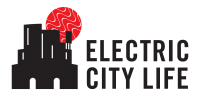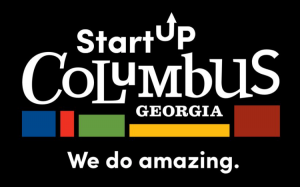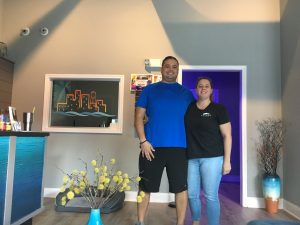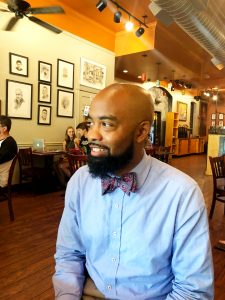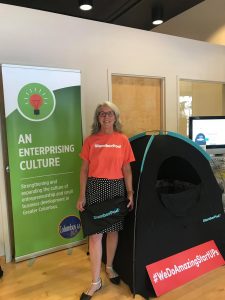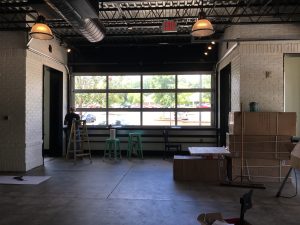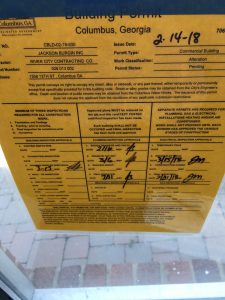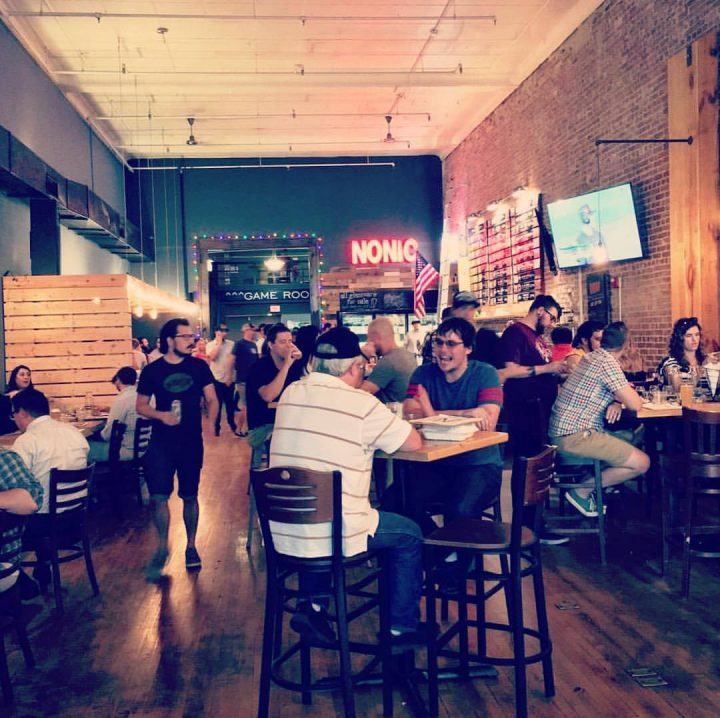
Hosting her next-to-last “Let’s Talk” community-conversation series inside the Springer Opera House in March, Mayor Teresa Tomlinson was asked by a South Columbus resident what the city was going to do to bring back the banks and retailers where the elderly woman had long deposited and spent her money.
Though blunt in stating such big-box operations won’t be coming back—not to South Columbus, not to anywhere in the new American economy—the mayor’s went on to explain why:
“I can’t even think of the last time I stopped in a bank branch,” Tomlinson said. “And retail has shifted. People now shop online.”
Noting that the resident’s nearby Walmart on Victory Drive is now the highest-grossing store in Muscogee County, the mayor offered a precise prophecy for what could (and should) fill that void: local entrepreneurs.
In a city where SPLOST funding goals for schools are falling millions short because people don’t shop in stores much anymore, and massive chunks of brick-and-mortar sit empty, Tomlinson said the hard work and dreams of mom-and-pop business ventures is what will fill those spaces in the 21st century.
Stats on the “2018 State of the City” sheet given out from the mayor’s office at the “Let’s Talk” event show that Columbus’ unemployment rate dropped four years in a row and a 3% increase in household income to $42,661 in 2016.
However, some say there is cause for alarm about the city’s economic future. There’s stagnant population growth in a state booming with new people. This compounds worries of a “brain drain” of top young talents to Atlanta, Nashville and the like. Board chair of the Columbus 2025 initiative Billy Blanchard (below) has publicly expressed the group has learned “we have a long way to go” to correct these two serious concerns revealed in its 2017 Regional Prosperity Initiative study.
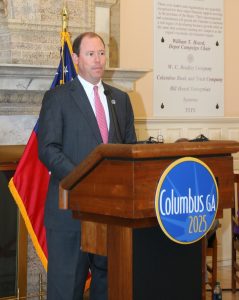
Given this importance placed on nurturing the entrepreneurial ecosystem, the questions that best provide the answer for the city’s future could be:
What’s it like starting a business in Columbus?
Do city laws and local culture help, or hurt, your chance of success?
Joey Wolfenbarger “wanted to do something more meaningful” than he found on his 14-career track at TSYS and his choice to venture out on his own when his wife Kristin was laid off by the Fortune 500 company in 2016.
Hip to the therapeutic effects of sensory-deprivation concepts, Wolfenbarger “tapped into a need” and became determined to create such an experience in Columbus.
“It’s more sensory overload than sensory deprivation,” he says of the experience at Uptown Float, where guests float in water filtered by UV high-spectrum rays and ozone gas that has 40% salinity. “It’s more intended to get you in touch with our body. Once you hit that zone, you see and feel your every moment.”
This idea was bolstered by a business plan completed with assistance from the local nonprofit SCORE, but was stuck in the permitting process from May 2017 to March 2018.
“It was a nightmare,” he says. “The months of delays and the attempt to make us change all our equipment nearly sank us.”
The problem was that the city’s health inspectors deferred to the state health department for regulation of Uptown Float, with the business being categorized as a public pool. This forced state inspectors to demand such requirements as using chlorine and bleach in the water. Adjustments would have cost more than $50,000, Wolfenberger says.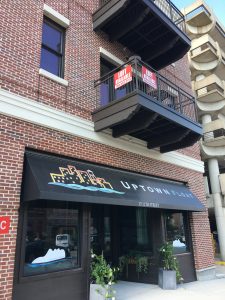
However, Uptown Float’s survival of restrictive red tape is a success story.
Despite the fact they spend $400 a month sending samples to a lab in Orlando for approval, the 11th Street business helped blaze a trail for similar businesses in Savannah and Braselton.
“Because of us they changed the state law and now follow federal guidelines,” Wolfenbarger says of a business idea clearly created outside the bureaucratic box. “It’s been received much better than I ever thought it would. People are less resistant than I thought. And the military presence helps, especially given a 2017 study that proves how much this can help recovery from PTSD.”
“We’re not here to trick you or tax you for everything you do.”
“It all starts with your certificate of occupancy,” John Hudgison, director of the city’s Inspection and Code Department, says of the process to open a physical place of business.
That COO will stipulate requirements to pass city inspection based on the type of business it falls under, with antiquated labels of mercantile and assembly still on the books. The city’s definitions of what types of business can go where became much easier to understand, Hudgison says, after the Unified Development Ordinance was adopted in 2004.
Still, issues exist and complaints come in.
“We want to know what we can do it to make it better for small businesses,”Hudgison says, pointing to the idea of mini-packets breaking down a process that still must be done at a counter inside the Government Center.
He says city agencies could have helped prevent nightmares, like Uptown Float’s situation, with advanced input from the new businesses about their plan. When the city isn’t forced to follow state law—such as with assisted-living housing, or spaces above 100,000 square feet—they can present front-end problem solving ideas to help a new venture pass inspection.
Zoning has stricter regulations, Hudgison explains, of the city’s Planning Department rules. Chief City Planner Will Johnson serves with Hudgison on Columbus Consolidated Government’s Leadership Development Committee and is looking to make these zoning improvements as part of the Columbus 2028 Comprehensive Plan.
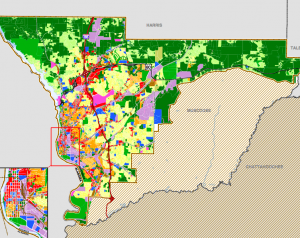

“We’re not trying to trick you or tax you for everything you do,” Hudgison says of the multi-agency attitude toward obtaining a business license. “We’re here to help you.”
“We’re a super conservative society here in Columbus.”
“From a policy perspective, there’s a lot of reason to start a business here, says StartUp Columbus Chief Entrepreneur Frank Braski. “The trick is figuring out how to cut through all the red tape.”
A sleek office space in the 1000 block of Broadway that opened up earlier this year, StartUp Columbus is a bustling example of the “fab lab” trend of establishing incubators to give entrepreneurs a physical space to connect and share ideas.
“It creates synergy,” Braski says of getting talented, creative minds together in an increasingly high-tech, virtual-network world. “You need a place where serendipitous meetings of people and ideas can happen.”
Earlier that morning, a construction worker came by with an idea for creating homes out of shipping containers. (Hodgson points out that as on July 1, Georgia law states that no local legislation, historic district rules or city code, can be placed on “modular” homes, defined as less than 400 square feet.) StartUp’s space hosted a launch party for Slumber Pods, a Columbus-manufactured product helping babies sleep, when it smashed its fundraising goals and is already on back-order.
Such synergy also arises at StartUp Columbus’ monthly SUDS gatherings (“a drinking group with a start-up problem”) over happy hour at local spots such as CIRCA Cocktails and MaBella’s.
However, Braski says there is data-driven proof that Columbus “isn’t a start-up town.”
“Historically, there’s been a lot of investment here but it’s very quiet, very back-room meetings,” Braski says. “We’re a super conservative society here in Columbus. Start-up isn’t in our vernacular. But why not here? Some of the world’s greatest brands—Coca-Cola, Aflac, TSYS—are incredible successes created right here. Let’s make it happen. And I’m super optimistic that we can.”
“We hear a lot of complaints about the disconnect…”
One of the new strategies of Columbus 2025 toward its regional prosperity goal tackles the area’s decades-old “brain drain” problem.
The initiative’s Talent Strategy Advisory group just formed to “begin creating a road map for talent retention, attraction, growth and development.” To see what such bright, young “talent” want in a city, this map should include the new citywide Dragonfly bicycle-trail system and a stop along it on 13th Street. That’s where a trio of 30-something entrepreneurs are expanding on their initial success in the food-and-beverage industry with Jarfly.
The new spot soon to be opened by the guys behind Maltitude and Nonic—start-ups downtown that represent a paradigm shift in what will prosper in a changing culture—Jarfly will be as much a communal space for Midtown neighbors as it is restaurant and bar.
Robert Battle, one of the Jarfly partners, illustrates this concept outside the former Loco’s Bar and Grill space. The outdoor patio, accessible and visible from the Dragonfly path he and his friends bike on regularly, will be covered with shade sails for a colorful canopy over a bocci court. Jarfly’s interior will be connected by a series of three clear-glass doors that open up like those for a garage, offering open air seating and views of Dinglewood Park, with its disc-golf course a huge bonus for its demographic.
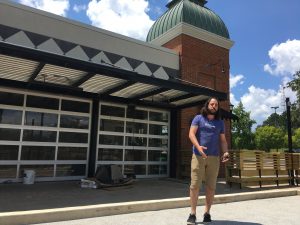
“We hear a lot of complaints about the disconnect some people feel living in this town,” Battle says. “Restaurants do contribute a lot into the economy and do employ a lot of people. But restaurants are also important because they are places of pleasure for people to come and relax.”
Battle and his partners (Miles Greathouse, Garrett Lawrence, and Chad Scrimpshire) took Will Burgin, owner of the Village on 13th that includes Midtown Coffee and Wicked Hen, on trips to Atlanta to study eateries and hang-outs they enjoy.
“We didn’t want to bring some Dave and Buster’s or Cheesecake Factory to town,” Battle, 36, says of the group’s vision.
“It was a lot easier because this is our second go-round,” Battle says of the process for obtaining a business license. “We knew the process so we were able to fast-track a lot of things. Really, all of us are of the work-for-yourself mentality, so this is the path we’d take regardless. But we’re happy that we can do it and make it work here at home.”
Electric City Life’s look into the local entrepreneurial eco-system is the first in a three-part series. Profiles of the region’s manufacturing economy and cultural economy will follow.
